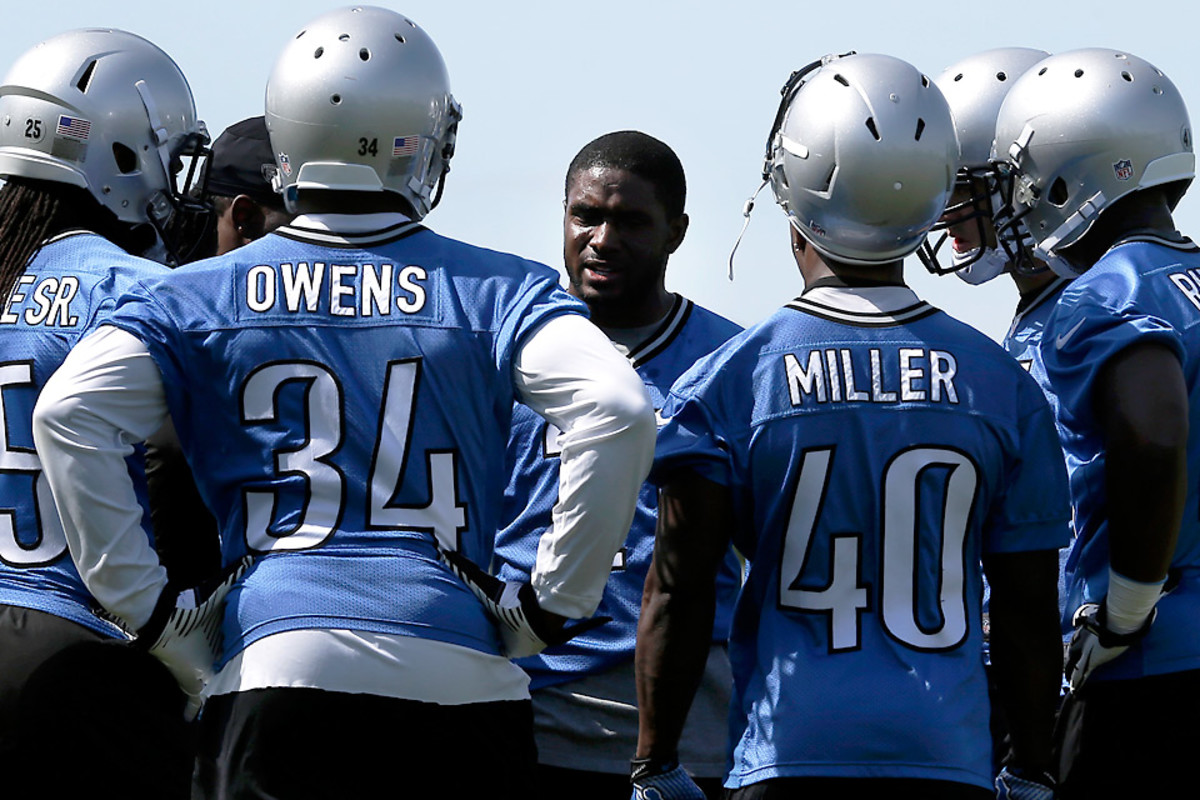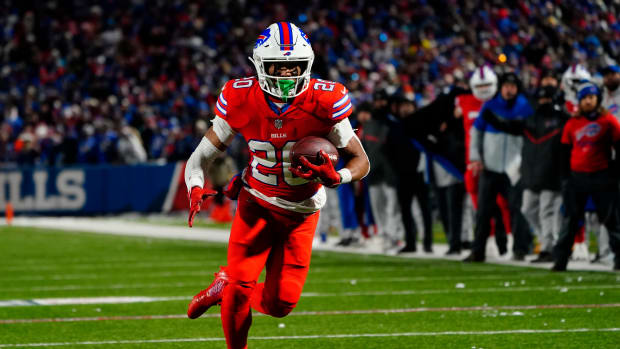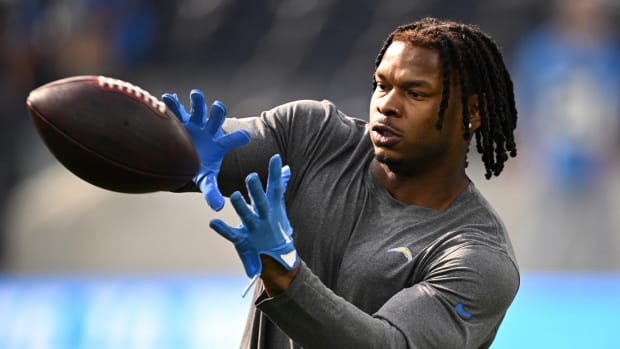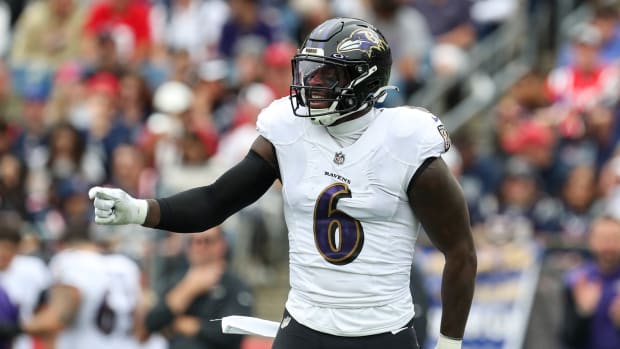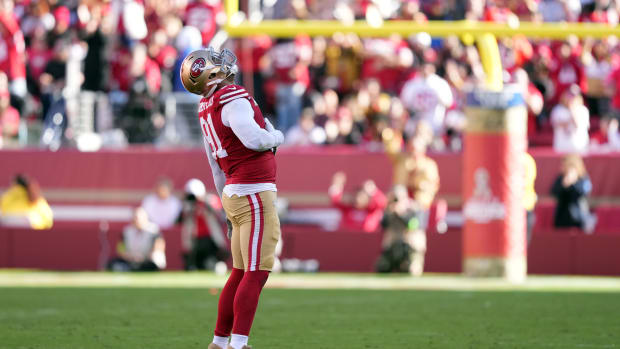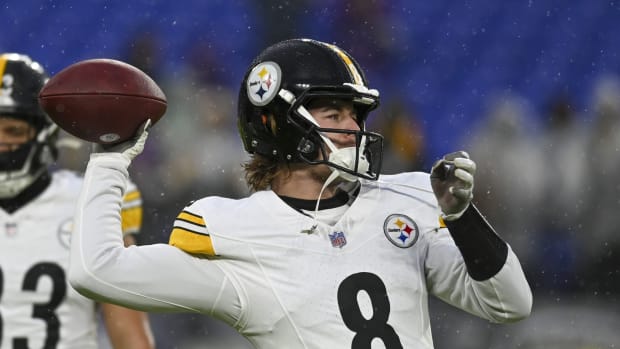Follow the Lions’ New Leader
ALLEN PARK, Mich. — The Lions’ second training camp practice ended at 11:20 a.m. on July 27, but Reggie Bush’s day wasn’t yet finished.
First, he took extra pass-catching reps on the JUGS machine. Then he retreated to the far field, where he was joined by undrafted rookie running back Steven Miller to run extra sprints. Finally, Bush signed several autographs before heading toward the locker room some 30 minutes after practice had ended. Soaked with sweat, he was the last veteran to leave the field. And it wasn’t even close.
There were a lot of reasons why Detroit signed Bush to a four-year, $16 million contract in March. He has the ability to end the Lions’ eight-year stretch without a 1,000-yard rusher, and he can be another weapon in quarterback Matthew Stafford’s arsenal, along with wideout Calvin Johnson and tight end Brandon Pettigrew. But the one area where Bush might help the most won’t show up in his statistics, though it could enhance the team’s overall production: leadership.
People around the Lions don’t talk about it. They can’t, not when Johnson and Stafford are the faces of the franchise. But the truth is, neither Johnson nor Stafford possess the kind of personality that screams they’re in charge. They’re more lead-by-example types, and there’s no shame in that. But the Lions are in desperate need of a shakeup. In 2011 they had their first winning season in 11 years, going 10-6 before getting spanked by the Saints, 45-28, in the wild-card round. How did they build off that success in 2012? With a 4-12 disaster, including eight straight losses to close out the season.
Enter Bush.
Nobody’s going to mistake him for Bill Russell in the leadership department, but Bush might as well be Charles Haley in the Lions’ locker room. The NCAA formally stripped him of a few accomplishments, but the players know what he’s done: The second overall pick in the 2006 draft won a national championship and the Heisman Trophy at USC, won a Super Bowl with the Saints four seasons ago and has scored 48 touchdowns in his seven NFL seasons. He rushed for 986 yards in Miami last season and 1,086 in 2011—his first time going over 1,000 in the NFL.
“To me, leadership comes through credibility, and these guys know who he is,” says Lions offensive coordinator Scott Linehan. “They see a guy that has credibility. That’s why I think he can come in here and impact us. He brings that experience factor.”
Vroom Vroom!
Darius Slay may not know Lambeau Field from a Lamborghini, but the rookie corner is getting up to speed fast. He’ll have to if Detroit’s secondary is going to improve. Robert Klemko on the young Lion’s learning curve.
Bush has been a Lion all of five months, but already he’s instilling a different attitude. “I’ve been really impressed with how quickly he’s come in and kind of taken charge of the running backs room,” says backup quarterback Shaun Hill, who trails only center Dominic Raiola (a vocal leader up front) in experience, with 12 years in the league. “And that’s filtered through the rest of the offense, and I’m sure the rest of the guys too. He works very hard and that has to rub off.”
Despite his production in Miami, the Dolphins still had doubts whether Bush would ever become a featured back who could work between the tackles, one reason why they bid him farewell this offseason. But they never questioned his greatest value. “Sometimes people may have certain perceptions about what Reggie is or isn’t,” Dolphins coach Joe Philbin says. “He was a guy who came into the building and worked hard every day. Being on the team was important to him, and I thought he was a pro.”
From the sound of offensive coordinator Mike Sherman just last week, Miami might be feeling a bit of a hangover from Bush’s departure. “When you have a Reggie Bush in the fold, there’s a certain identity,” he said. “This year guys have to create their own identity.”
For a Detroit franchise that’s desperate to distinguish itself—eight of the past 10 seasons have resulted in records no better than 6-10—Bush’s arrival is perfect timing. The Lions are at a crossroads. Talent dots the roster, yet Detroit has failed to capitalize. This could be the last run for coach Jim Schwartz and general manager Martin Mayhew if there isn’t improvement.
“I’m not trying to take over the team,” Bush says. “I’m not trying to say, ‘This is how we do it because this is the way I do it.’ I’m just trying to provide an outlet for some of the younger guys to help show them how it’s done. And then, hopefully, I can bring a little bit of leadership to the team as well.”
Reggie Bush has faced criticism in previous years, but he has developed into an underrated rusher. (Carlos Osorio/AP)
The Lions could use some help on the field, not just in the locker room. Call it the Curse of Barry Sanders, but Detroit hasn’t had a consistent running back since Sanders retired, at 30, after gaining 1,491 yards in 1998 (his 10th straight 1,000-yard season). Since then, there have been just three 1,000-yard seasons: James Stewart (’00 and ’02) and Kevin Jones (’04). The succession of replacements—Greg Hill, Stewart, Jones, Smith, Jahvid Best, Mikel Leshoure—didn’t last long. Most were done in by injuries.
Bush, a Sanders fan as a kid, knows all about the Lions’ unfortunate history with running backs. But he didn’t realize it’s been eight years since the Lions last had a 1,000-yard rusher. “Well, hopefully we can make that happen this year,” he says, flashing that megawatt smile.
The Lions averaged 4.1 yards per attempt on the ground last season, two-tenths below the league average, and Linehan is desperate for more punch. “We did not have big plays out of our running game for the entire season,” the offensive coordinator says. “We’ve got to get chunks out of both our running and passing game. You have to be able to affect the scoreboard with both parts of your offense. That’s what we’re aiming for.”
It might surprise some given Bush’s struggles running the ball with the Saints, but as an every-down back with the Dolphins the past two seasons, he ranked sixth in the league with 63 rushes of 10 or more yards—ahead of Chris Johnson (55), Ray Rice (55) and Matt Forte (54).
“I felt like I still had to go through some growing pains to get to where I am now,” Bush says. “I was a natural playmaker, I don’t think I was a natural runner. I can naturally make big plays, that was easy, but when it came to doing the little things and getting the three yards here, the four yards there, finding the holes, I don’t think I was mentally ... I don’t think I was a good runner in that sense.”
The Lions also want Bush, who has more receptions (372 for 2,730 yards) than any other running back over the past seven seasons, to be a factor in the passing game. Anything to draw coverage away from Johnson is welcome, which is why Stafford kept hanging around the Lions’ front office as they closed in on Bush.
“I had studied him quite a bit this offseason too, and was kind of right there when they got the deal done,” Stafford says. “It’s great to have a guy like that. He’s done it both ways. In New Orleans he caught a lot of balls out of the backfield, then in Miami he had a bunch of carries and rushed for 1,000 yards. So he’s a dual-threat, a guy that can hurt you out of the backfield catching and running the ball.”
As Hill, the backup QB sees it, the Lions will be able to match Bush up “on a linebacker in most cases; worst case on a safety. So they have to figure out how to cover him in the pass game, and if they want to put a bunch of DBs on the field to stop us passing, we like our chances running. It is quite a chess match you can play with an athlete like that.”
There’s just one small detail that could be a factor with every step Bush takes. The Lions better hope the new surface they installed at Ford Field, the FieldTurf Classic HD, was worth the money (the Lions didn’t reveal the cost, but such a replacement can run upwards of $1 million, according to Crains Business Detroit) because Bush has never been crazy about the artificial stuff dating back to his Saints days.
“Well, I know that turf just sucks. There’s no way around it, you know?” says Bush, laughing. “There’s no substitute for natural grass. I honestly believe that. I’ve felt like that my whole career. I feel like the few injures I’ve had have been because of turf. But now I’m mentally more prepared for it. And I think I’ll be better off for it because I’ll know how to handle certain situations in the game ... it just comes from experience.”
Winning in the NFL is a similar proposition. The Lions didn’t have much know-how in that department before Bush’s arrival. They do now.
Read Andy Benoit’s 2013 Lions preview: The Deep Dive.
































